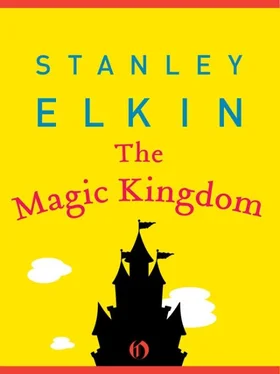Charles Mudd-Gaddis, that little old man, dreams of his first birthday. He dreams the cake and dreams the candles, dreams the balloons and dreams the streamers; he dreams the toys, he dreams the clapping. And dreams he’s three, the little boy, who would have been a man by now — twenty, twenty-one. Then dreams the girl, six, to him a woman. And now he’s five and pushing forty. Ah, to be thirty-four again! he dreams. And dreams he’s seven and confusion comes, that white aphasia of the heart and head. And dreams in awful clarity it’s now, and can’t recall how old he really is.
Rena Morgan can’t tell if she’s awake or sleeping. She’d sensed Miss Cottle pass down the aisle, the trace of tobacco scent clinging to her clothes and skin like an odor backed up in a cellar. In what is more likely sleep than not, she brings a hanky, which she is never without, up to her nostrils, and mildly blows, delicately, ladylike, folding the discharge into a dry patch of handkerchief as expertly as a magician hiding a coin. She has taught herself to make these passes at her face before actual mirrors, using as her model images she’s picked up of tragic ladies dabbing at tears in the corners of their eyes, her fingertip eased along a groove of linen so that, when it works, as it almost always does now that she so perfectly executes the gesture, it isn’t as if she were wiping tears away at all so much as brushing cosmetics into her flesh or whisking flecks of mascara and excess powder out of her vision — even in sleep there is exactly that look of concentrated dispassion on her face — doing all the last-minute repairs and touch-ups of grace. Yet it is really as tears that she thinks of her mucus, some vast reservoir of the sorrowful, her sad pain treasury. She fills her hankies and disposes of them in her sleep, folding them neatly into pockets, putting them under pillows, a kind of controlled, sedentary somnambulism, her tricky cardsharp slumber. She doesn’t know why she does this (or even how), though she supposes it a form of pride, some maidenly self-governance, romantic even, the hope-chest antics of the heart. But has no time for dreams and, vigilant, ever on her toes, can never quite tell whether she dozes or is wide awake.
In Monte Carlo, Benny Maxine held a bad hand and waited for the croupier to scoop in his losses.
The amputee, Noah Cloth, held up his bad hand and counted his losses.
This was the best time, thought Nedra Carp. The children all tucked and making their bye-byes. She even enjoyed their little snores. Hardly snores, really. Barely rustles. Just only some tinny nasality of warmed air. In with the good, out with the bad. Though she couldn’t hear even this. Not over the husky drone of the motors. (Engines, would they be?) Or, for that matter, even see her charges. Only, on her right, Charles Mudd-Gaddis and, on her left, Rena, who, in her sleep, raises hankies to her eyes as though she dreams something sad, watching whatever it is like some warmhearted little dear at a play or cinema. She likes such tenderness, enjoys being with children who can’t hold back their tears when Bambi’s mother dies or, at the pantomime, when Cinderella’s wicked stepmother and stepsisters plot against her. She doesn’t care what they say, sentiment is the only true breeding. Prince Andrew had shocked her when he’d been small and had watched with cool indifference and unalterably dry eyes the terrible sufferings of Hansel and Gretel when they finally realized that their father, that hen-pecked woodcutter, meant actually to abandon them in the forest just because his shrew of a wife told him there wasn’t enough food to go round. It’s a jolly good thing for the U.K., Nedra Carp thinks, that Andrew is so far removed from the succession. Monarchs ought to be properly compassionate, she feels, to understand that not all their subjects are as well-off as themselves. Ho. Not half, they aren’t. (And wasn’t that woodchopper’s wife another stepmother? Though Nedra doesn’t let the husband off so easily. The reconciliation at the end is all very well, but if she were those two she wouldn’t have been so quick to jump back into his arms. Suppose times turned bad again. Suppose…Well. Once burned, twice sorry.)
Or even, when it comes down to it, tucked. Not properly anyway. Only a dusty old airline blanket thrown over them, smoothed about their shoulders and flowing loose about their torsos. Hardly like being in their own beds, though one does one’s best. And recalls the healthy children she has tended. Nedra, reading them stories, stroking their heads, has almost absorbed their soporific comfort, that agreeable ease and comfy coze, their bodies’ balmy thermometry and featherbed climate just so, like a snug tropic. Oh, yes, she knows well enough how they feel, their maiden, their bachelor laze and grand smug innocence and sometimes wonders if she takes this from them to bed with her, if the memory of that heavy rest that lies about her like perfume is not hers but the airy burr they exhalate? Is all this, to her, to Nedra Carp, what their stuffed animals and bits of blanket and fingered cloth and crushed bunches of palmed wool are to them? She rejects the supposition. She stands in loco parentis, after all. Yes, she thinks grimly, like all those wicked stepmothers. Yet she is not wicked, if anything too tender, discipline not her strong suit, her lack of firmness a weakness. Ha ha, she laughs in her reverie, that’s a good one; lack of firmness a weakness is a good one. Yet she knows the literature well enough, the stories of stern nannies, repressed, dried-up old crazies jealous of their privileged charges. Letting them howl their hunger, then tweaking them in the nursery, laying on sharp twists and pinches when no one important’s about, gossiping in the parks among the sisterhood. Oh, well, they probably meant governesses. To the uninitiated, governesses gave nannies a bad name.
It’s ironic, Nedra Carp thinks, but here I am, off to America, to Disney World, Florida, and feels a queer thrill. It was Mr. Disney and the Yanks that made Mary Poppins famous, a household name throughout the world, in all the climes and cultures, a comfort, a tonic. It’s silly, she thinks, I’m no R.C., but Mary Poppins is practically my patron saint.
She was. Nedra Carp imagines Mary Poppins watching over her, not convinced of so much as comforted by the idea of her presence. She has seen the film seventeen times, and though she knows she is nothing like that mysterious woman, has neither her powers nor her flair, yet it is to Mary she turns when she’s in trouble, to Mary to whom she flies now high above the watery rooftops and smoking chimney wisps of the clouded world. And thinks of Mary, that stout, good-natured voyager, of Mary of England and all the globey sky. And knows that it’s because of Mary Poppins that she makes this trip, racing toward Disney World as to a sort of Lourdes, bringing, who has no talent even for changing a diaper and is probably embarrassed by it, no skill with even feverish children let alone dying ones, who cannot make even healthy children laugh or, for that matter, keep them entertained or, if you must know, make them behave, who has none of Mary Poppins’s aptitudes but only her own dull gift of love, flying to Florida, to her patron there — maybe there — to pray before some very likely tarted-up, possibly animated saint. Off to Orlando, who is in the wrong profession and whose love of little children is unrequited, a repressed, dried-up old crazy herself, one muy loco parentis who can’t bear to think of those characters she carries in her handbag like a packet of tame old love letters.
Nedra Carp, Nedra Carp thinks. With my name like a fish. And though most of her employers these self-conscious, egalitarian days call her Mrs. Carp — the Queen herself did; lisping Andrew, keeping his distance, did — she has never married. And knows those aren’t love letters she carries in her purse but only her tepid warrants and credentials — she’s peeked; she’s read them — like the lukewarm references of someone honest and even diligent but uninspired. And knows, too, that if she had married it would probably have been to some widower with kids, in loco parentis again, in loco parentis always who would never have a place of her own. And also knows, as she knows she’s never gossiped about her charges or practiced any of the petty cruelties of her trade, that she would starve rather than deny her stepchildren even one morsel or talk behind their backs to the woodchopper, that unlike Cinderella’s stepmother she could play no favorites, not she, she thinks proudly, not Nedra Carp, who has, for good or ill, like a built-in murmur, her adoptive heart.
Читать дальше












